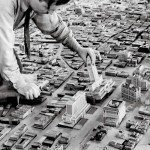

Words of Fire, the Frying Pan’s new poetry section debuted this week with a series poems the new mayor should read.
These five poems by some of L.A.’s finest poets are intended to help Mayor-elect Eric Garcetti look closely at our city and listen with care to its diverse voices, from janitors to sidewalk fruit sellers to donut shop insomniacs. They are also an antidote to the platitudes of the campaign trail, and a reminder that the best political speech – and acts – can tap into people’s deepest emotions and aspirations.
A Model of Downtown Los Angeles, 1940
 The oldest Mercedes in California adorns
The oldest Mercedes in California adorns
the crowded foyer of the L.A. County Museum
of Natural History, and babies shriek like bats
in the elevator that lowers my daughter
and me to the basement….
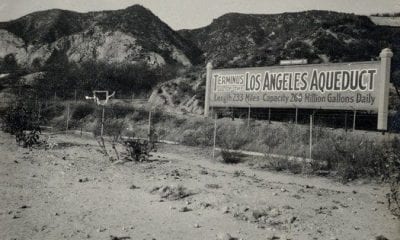

It’s a bright, guilty world.
–Orson Welles in The Lady from Shanghai
But there is no water.
–T.S. Eliot, The Wasteland
The oldest Mercedes in California adorns
the crowded foyer of the L.A. County Museum
of Natural History, and babies shriek like bats
in the elevator that lowers my daughter
and me to the basement. There, among the faint,
intermingled drifts of ammonia and urine
from the men’s room, phantom display lights
luring the shadows over the inventions of Edison
and Bell, and dusty monuments to a century
of industrial progress, lies the mock-up L.A.,
whose perusal has been assigned to my daughter’s
fourth-grade class in California history.
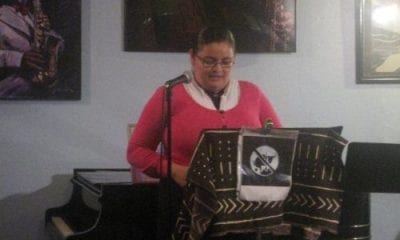

As dawn breaks through the crimson curtains,
you rise, kiss Amá goodbye, the only time
I see you do this, drive away,
circles of dust and tire marks remain.
You return four months later with the trunk full
of crates of strawberries peaches, apricots,
grapes, and plums. The nectar seduces our lips,
seeps through our fingers. Our nights fill
with dreams of this Garden hidden
in the center of the valley.
Most nights you sit in the dark, whisper
about a scornful sun, of being forced
by a landowner to hold a blue whistle
between your lips so you won’t be tempted
to consume the fruits you pick. The sound
of whistles merged with the rustle of the wind
fills the fields like a bird song.


How a union of Yale employees aligned itself with community activists and won control of a beleaguered city.
This article and illustration originally appeared in The American Prospect.
Major Ruth became a civic leader because he made a promise to his neighbor, Brian Wingate. Both had moved to the Beaver Hills section of New Haven, Connecticut, in 2003. A neighborhood of aging single–family homes that had seen better days, Beaver Hills had been targeted by the city for a housing–rehabilitation program, and, with the zeal of new arrivals, Ruth, a manager at the local utility company, and Wingate, a custodian and union steward at nearby Yale University, sought to involve themselves in neighborhood–improvement ventures. That proved harder than they had anticipated. Although New Haven aldermanic districts are tiny, encompassing no more than 4,300 residents, Ruth and Wingate couldn’t find anyone who could identify,
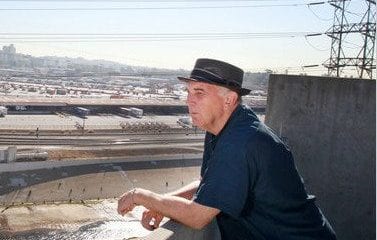

“If politics were the science of humanity.”
–W.C. Williams
Dear American people, I’ve just got
to talk to you about your government.
You are the government,
the way we are the earth and sky, the way
we are the blood and the government
the branches of the tree. You and I
are the government and we need
no more amateur presidents, please.
Once again, if you and I are the suit,
the government’s the tie we wear into the world.
America, we are the fabric; and to knit that tie together
takes statecraft. Is it too much to ask ourselves
to pay attention?
To make of government a proper tool?
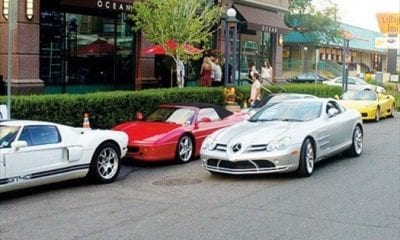

Last Friday, my wife, Susan, was out where Santa Monica meets Brentwood to tell the President not to approve the Keystone XL pipeline. No one caught a glimpse of him, of course. What she did see were scores of expensive cars moving down San Vicente – black, big SUVs, as usual, and top-of-the-line Mercedes and BMWs but also Jaguars, Ferraris, a Rolls, even a Lamborghini, plus others she couldn’t name. These cars begin at $75,000 and go to the mid-six figures.
Also trying to wind though the traffic maze were the workers, gardeners in small, beat-up Toyota pickups, house maids in compacts from 20 years ago, bunches of Latinas waiting at the bus stop for public transportation and delayed by the President’s presence at a fundraiser in a nearby home. The juxtaposition of the vehicles of the very wealthy and those of their servants was what she found remarkable about the experience.
» Read more about: Santa Monica’s Lethal Shootings and the Culture of Economic Desperation »


It’s late, so the late
Karen Carpenter comes off
the radio at 1 a.m. The diners
complain; she’s passé, she’s so
post-mortem. You see,
it’s Night of the Living.
Outside the sirens rise up
and home in. Now I’m upstairs
asleep, lost to this din,
but downstairs the Usuals
stake out a square
of linoleum, sit down and
fit in.
Like the jailed I bet
they get the same damn thing.
Some special—Styrofoam.
They sip the rim. I bet
at this hour the donuts
lie face up, half
human. The walls are glass
there, so those guys can see
the fix they’re in: a block
of illegally parked cars,


In How Enterprise Zones Are Killing the California Dream, Frying Pan investigative reporter Gary Cohn looked at the impact of the controversial program, including workers who lost their jobs while their former employers received tax breaks for hiring lower-paid replacements. He also reported on two strip clubs revealed to have benefited from the secretive program. The governor and legislators have now put forward proposals to reform the program or replace it with other economic development programs. This post originally appeared in Labor’s Edge.
You’ve probably seen the stories by now: Enterprise zone tax breaks, which are supposed to provide incentives for good jobs, are instead going to strip clubs and low-wage mega corporations like Walmart.
The current enterprise zone program is shrouded in secrecy, with virtually no accountability or transparency. Study after study shows the program is a massive failure,
» Read more about: End the Enterprise Zone Abuse: Gov. Brown’s Good Jobs Proposal »


after the long day’s hustle, Papa returned
home waving fistfuls of Tootsie Rolls, wolfed down
his supper, changed from his suit into his long-sleeved
gray coveralls or blue cotton smock and slid out of
silky stockings and Italian leather loafers into white
cotton socks and well-scuffed All-American work shoes
for his night shift scrubbing and waxing corporation floors
we missed his loud full laughter
around the television and what company we had
wasn’t as interesting as the visitors
who came through when he hung around home
but we trusted Papa was doing his best
to become “healthy, wealthy and wise”
without shame over shameful wages—enough
indian head nickels to finance a scheme
(the men he worked graveyard with
always became buddies
and no matter whose car broke down,


America’s economy will suddenly grow by $400 billion — roughly three percent –on July 31, when the Bureau of Economic Analysis begins to include in its GDP calculations the value of investments in such intellectual property products as songs, books and movies. The new numbers will reveal that Stephen Sondheim, Stephen King, Steven Spielberg and Ray “Even Stevens” Stevens have been far more important to the nation’s financial well-being than government stats have previously indicated.
This news feels as uplifting as a double dose of premium-grade placebo. But there’s more than feel-good bookkeeping at stake here. Plays, stories, films and music generate wealth – wealth government stats are supposed to measure.
The nation has always struggled with who owns that wealth. In the Wild West frontier of the internet, music, films and news were easily pirated. Now, there’s a newer, quite possibly wilder West,
» Read more about: Digital Fabrication: More Than the Stuff of Dreams »